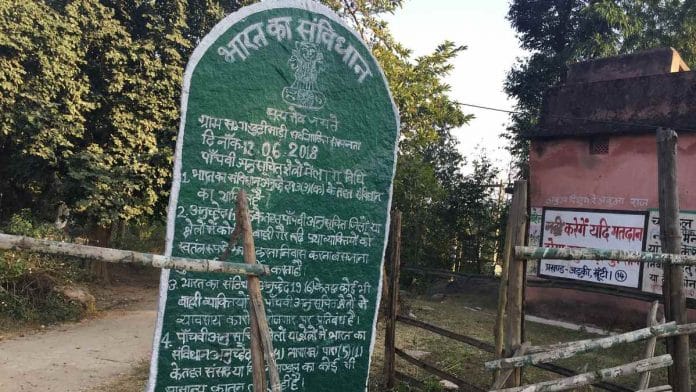New Delhi: Hemant Soren’s first action as chief minister of Jharkhand was to order the withdrawal of cases registered against people allegedly involved in the Pathalgadi movement.
The previous BJP government in the state headed by Raghubar Das had reportedly booked
more than 10,000 people for sedition under Section 124A of the Indian Penal Code for participating in the movement.
Soren’s Jharkhand Mukti Morcha had promised to drop the cases as part of its manifesto for the recently-concluded assembly elections.
ThePrint explains the Pathalgadi movement, as well as the proposed amendments to the Chotanagpur Tenancy (CNT) Act and Santhal Pargana Tenancy (SPT) Act that triggered the movement.
What is Pathalgadi?
‘Pathalgadi’ literally means carving a stone — it is an ancient tradition in the tribal communities of Jharkhand. Adivasis usually erected engraved stones to mark the birth or death of a person.
The practice took on a new meaning after tribal activists, former IAS officer B.D. Sharma (now deceased) and IPS officer Bandi Oraon, initiated the practice of erecting stones outside villages after the Panchayat (Extension of Scheduled Area) Act came into existence in 1996. That Act empowered the gram sabhas or panchayats to safeguard and preserve their traditions, community spaces and culture, and gave them the right to mandatory consultation in land acquisition.
The two civil servants got stones engraved with the provisions of the PESA Act to spread awareness among the tribals about their rights.
These green-painted stones are usually 15-feet long and 4-feet wide, and are found in four districts of Jharkhand, including Khunti, the birthplace of Adivasi icon Birsa Munda. The stones include excerpts from the PESA Act and the Fifth Schedule of the Constitution of India, which deals with the administration and control of ‘scheduled areas’ as well as of Scheduled Tribes residing in that area.
The stones signify self-rule by the local gram panchayat, declaring the village as sovereign territory and prohibiting the entry of outsiders into the village. The supporters of the movement also declare the gram sabha as the highest authority, and refuse to obey the state and central governments.
Also read: Jharkhand no exception, tribals are rejecting BJP in one state election after another
CNT and SPT acts
The CNT Act was enacted in 1908, eight years after the death of Birsa Munda. This Act extends to the north and south Chotanagpur and Palamau divisions.
The SNT Act was passed in 1949, extending to Dumka, Sahibganj, Godda, Deoghar and Pakur in the Santhal Pargana region in eastern Jharkhand. Together, these Acts granted special protection and land rights to the tribals and prohibited the transfer of tribal land to non-tribals or the commercial use of the land without the permission of the concerned gram sabha.
BJP govt’s ordinances
In May 2016, the BJP government introduced two ordinances — the Chotanagpur Tenancy Act 1908 (Amendment) Ordinance and Santhal Pargana Tenancy Act 1949 (Amendment) Ordinance, which enabled commercial use of tribal land and made it easily transferable. The Act empowered the government to procure agricultural land from tribals for non-agricultural purposes.
The Pathalgadi practice regained prominence after the ordinances were brought in, with tribal people erecting new stones as a mark of protest. They named it a battle for “jal-jangal-zameen” (water, jungles and land).
The ordinances were passed by the Jharkhand assembly in June 2017, but after objections from political parties like the JMM, Congress, the Left as well as residents of the state, Jharkhand Governor Draupadi Murmu asked the government to reconsider its decision. The government later withdrew the ordinances.
Also read: Jharkhand victory gives Lalu more comfort in hospital but RJD problems remain
Violence over Pathalgadi
However, clashes between the establishment and the local population continued and turned violent, leading to allegations of the movement becoming more radicalised and fuelled by separatism.
In June 2018, five women of an NGO, who were in Khunti district to raise awareness against human trafficking, were allegedly abducted and raped. The police blamed leaders of the Pathalgadi movement for the crime.
According to a report by Scroll.in, more than 10,000 people were booked for sedition between June 2017 and July 2018, when the movement was at its peak, which is “possibly the highest number of people booked at one time in one district anywhere in India”. These people were booked for “exciting, or attempting to excite feelings of disaffection against the government”.
Thereafter, the local residents decided to boycott the 2019 Lok Sabha elections.






